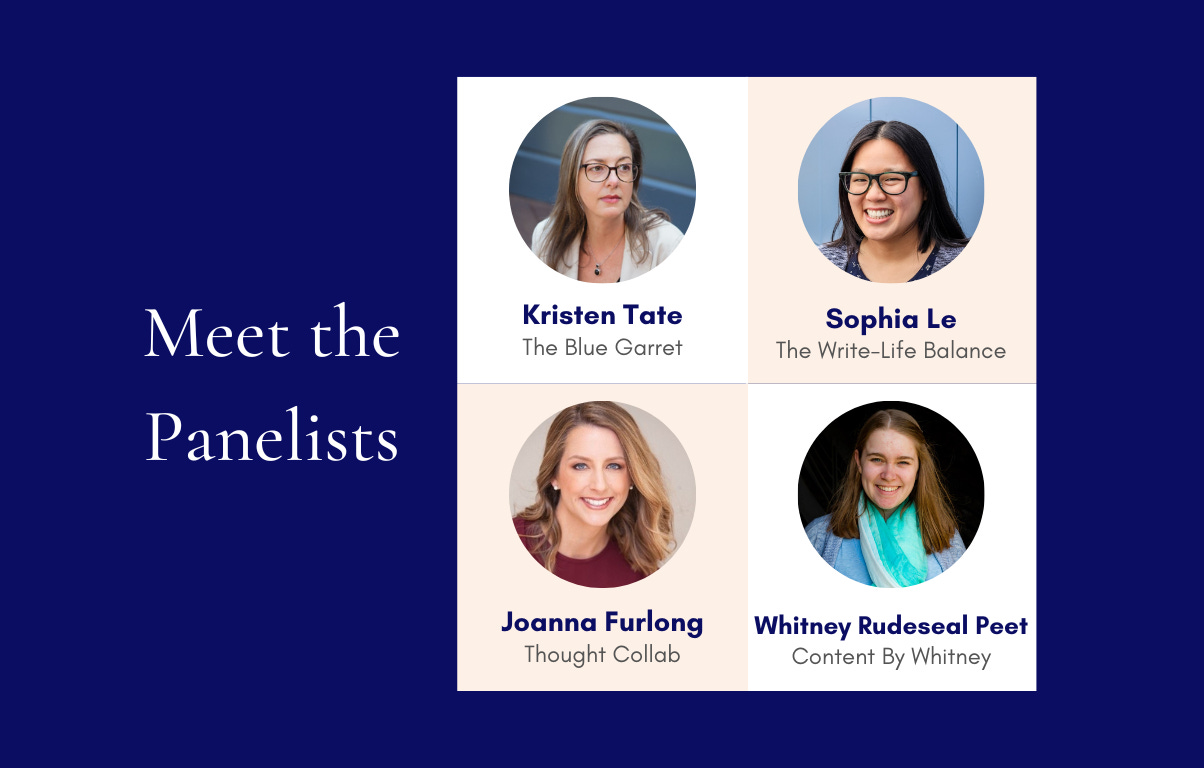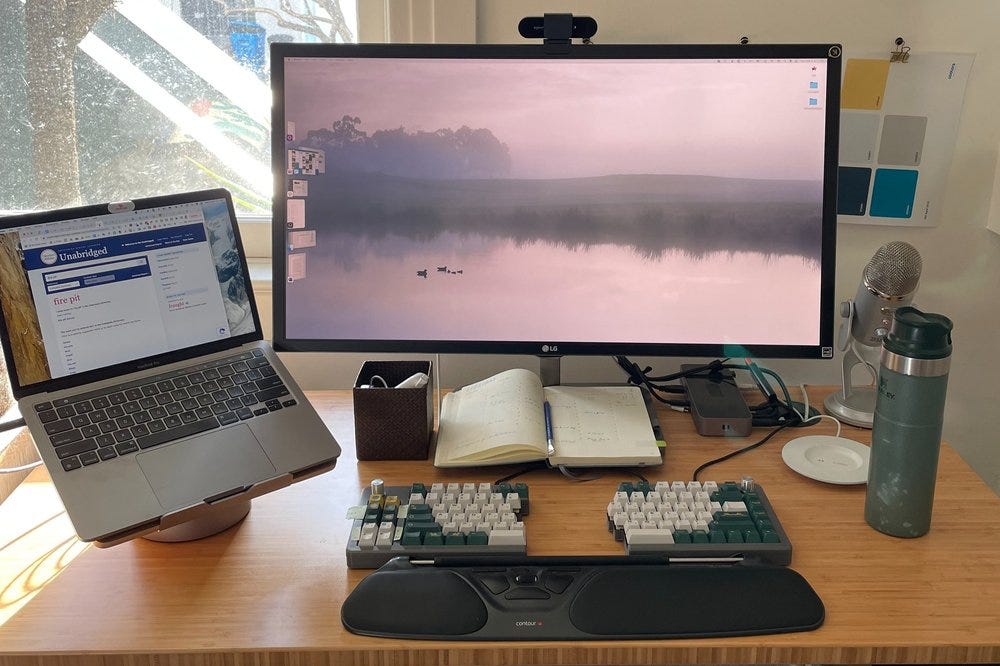I truly believe in the power of building a village of people to learn from, lean on, and collaborate with. Experts who have navigated the path you aspire to take and can share their words of wisdom. Nobody has made a truly unique life decision, so why not seek the advice of those who have come before you?
When it comes to quitting my day job to focus on my writing and build a freelance marketing business, I’m grateful for my village, which includes the following four women who have walked alongside me at every step of the journey. As a novice self-employed creative, I wanted to ask them all how they balance their passion and profession, so the rest of my community can benefit from their experiences.
Keep reading to meet our panel of self-employed creative masterminds and dive into an honest, lively conversation about everything from career transitions and goal setting, to parenting and common pet peeves. They don’t hold back, and neither should you—so if you have questions of your own, feel free to comment below!
Now let’s jump into this no-holds-barred Q&A on creativity and self-employment.
Meet the Panelists
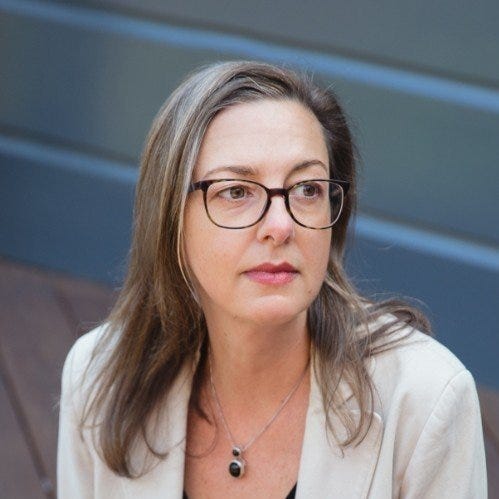
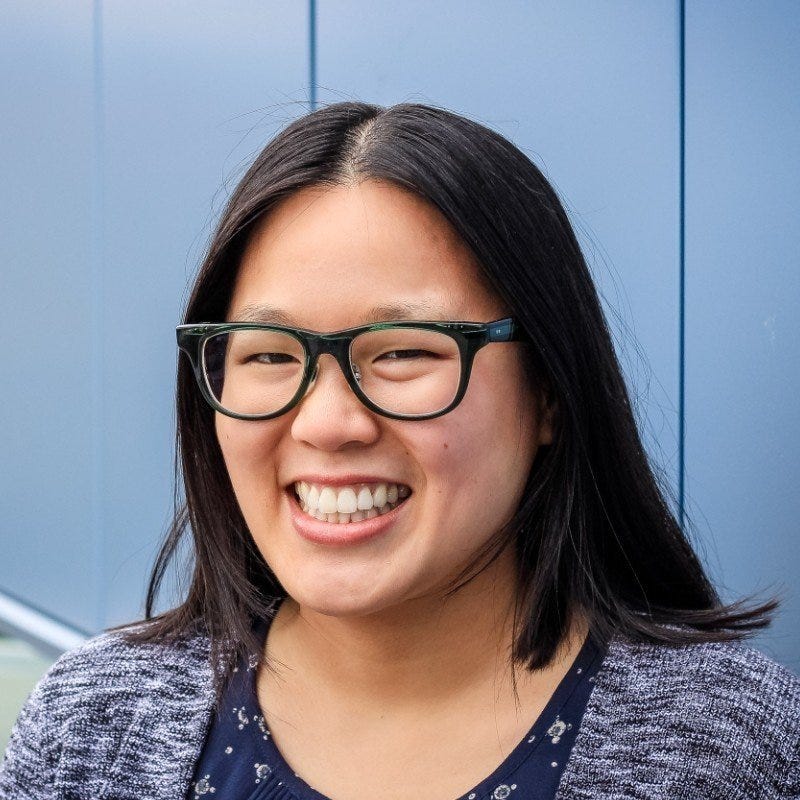
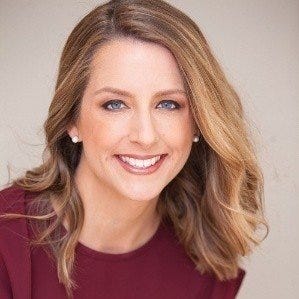
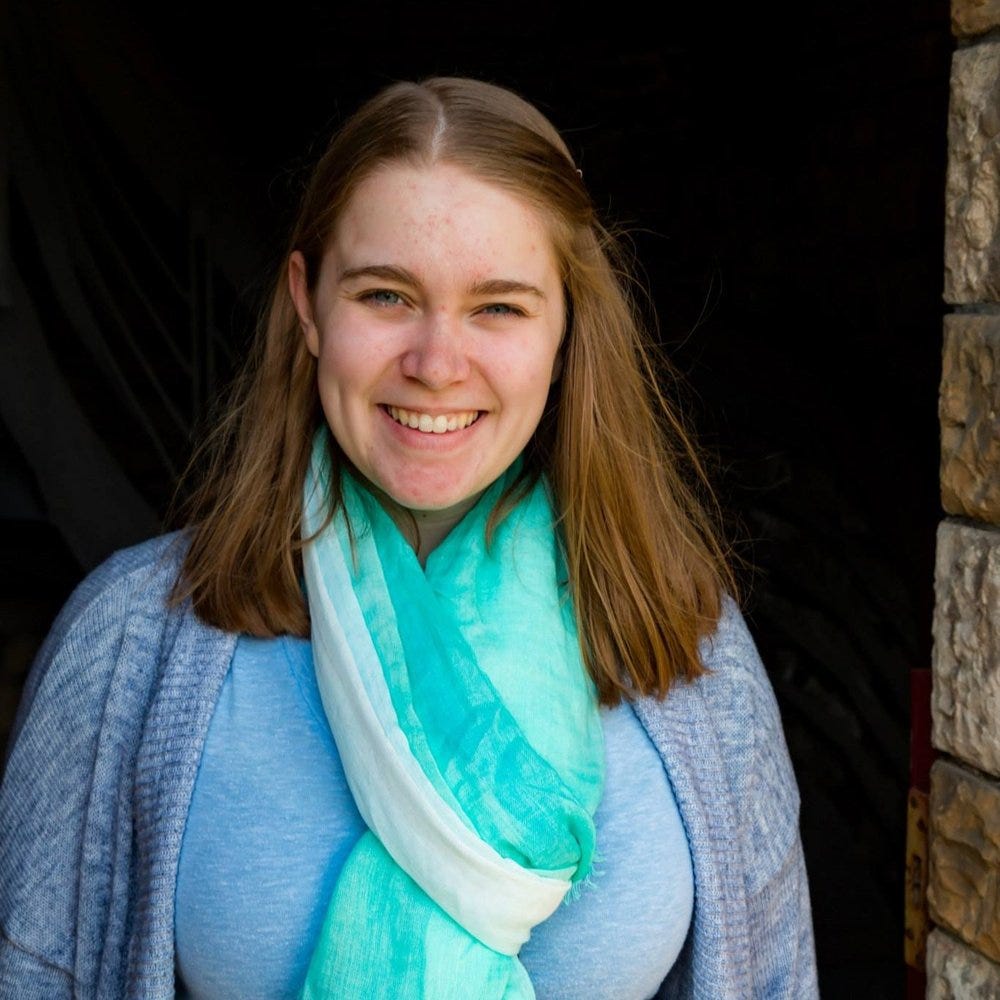
A Q&A on Creativity and Self-Employment
1. Tell us about yourself! How would you describe who you are and what you do?
Kristen: I’m a freelance book editor, working primarily with fiction writers to help them get their work to the finish line, whatever that means to them. For some writers, I provide developmental editing and help with query letters as they prepare to search for an agent. For other writers, I provide a focused line edit and help with their book blurb as they prepare to self-publish. Whatever the goal, my job is to help writers get there, step by step.
Sophia: The short answer: I’m a freelance writer. The longer answer: I write stories about Vietnamese American women and how their cultural identity impacts life, work, and relationships.
Joanna: I am an executive communication strategist, thought leadership coach, and writer. I help executives and entrepreneurs discover and own their voice, key messages, and values—and share them with the world. Outside of my ‘“day job,” I’m a creative writer (fiction and personal essays are my thing!), avid cook, mom to two incredible kids, and partner to a wonderful husband.
Whitney: I'm a lifelong learner, and I've definitely taken that approach to my content writing and marketing tactics. I work with a number of clients, mostly in the B2B SaaS space, with strategy, content marketing, copywriting, and project management. Now that I've started to balance that work with more creative, personal pursuits like voiceover work and writing my own novels, I'm learning more now than ever and absolutely loving it.
2. Walk us through your career path. How did you get started in your industry, and when did you make the jump to self-employment?
Kristen: I took a very winding path because I thought I wanted to be an academic, and it took me several years (and a PhD) to discover it wasn’t right for me. I also explored publishing jobs, but the low pay and long hours outside the house didn’t match what I needed at that time. I was newly divorced and the primary parent of still-young kids, so I knew the flexibility of freelancing would be a perfect fit for me if I could earn enough. This was just about the time self-publishing was taking off, so I had a hunch that I could build a career by focusing on book editing.
Sophia: I've always written in my various jobs (policy researcher, project manager, communications/marketing coordinator), but it wasn't until I quit my job in government to freelance that I finally felt comfortable calling myself a writer—first as a copywriter, and then a content writer. Most of my published work has been in the B2B SaaS space, so it's been a refreshing change to write about something I deeply care about for the last two years.
Joanna: I’ve been writing my entire life, so studying journalism in college felt like the natural thing for me. However, when I graduated, I took the first job I could—a marketing gig at a Fortune 500 tech company. I’ve now spent nearly 20 years in marketing, and in every single role, at every company, being a great communicator and writer always came to my rescue. When I became disgruntled with my job around 2015, I quit to consult full-time to focus on content creation for startups and tech companies. It’s taken me on a wild ride, and I have zero regrets.
Whitney: I was getting my Master’s in English Literature when I needed to get a job to help pay for tuition. My brother-in-law got me an interview for an internship position at Salesforce for the Pardot client success team, and that was my first intro to email marketing. When I graduated, I got a job at a local agency in the Atlanta area as a marketing automation specialist but quickly learned that I really missed writing. I made the jump to self-employment after my third corporate gig and many situations where I just didn't jive with other people's views on how marketing should work. I'm so glad I took the leap, and I've never once looked back.
3. What led you to the decision to start your own business, and how did you navigate the transition?
Kristen: By the time I decided to go all-in on freelancing, I’d been doing regular copywriting and editing work for a few nonprofit and corporate clients. I’d cut my expenses drastically by moving into a small attic apartment owned by a friend, which is where the Blue Garret name comes from! Having that financial breathing room gave me time to take some editing courses and increase my client base. It took me about two years, but eventually I was able to match the salary I would have been making at a full-time publishing job, and now, several years later, I’ve exceeded that.
Sophia: My husband got diagnosed with cancer, and we lost his dad unexpectedly a few months later. It was a personal wake-up call that got me thinking, "Do I really want to spend the rest of my life working 12-14 hours a day?" My husband already had an LLC set up, so transitioning to self-employment was super easy. All I had to do was quit and move a few pieces of furniture.
Joanna: On personality tests, I skew super high for embracing risks, being resourceful, and seeing the big picture. When I first started my own business, my husband was working at a startup, and I could hear the joy in his voice—he was invigorated by the possibilities. I just told him one day, “I am going to quit my job this week and consult.” He was completely supportive, and I resigned a few days later. I’m a big fan of leaping through open doors and saying “Yes!” when opportunity strikes. Don’t over-engineer the process—just say yes, just start.
Whitney: A huge part of my decision to start my own business was because I was so burnt out in my corporate jobs and just needed a break from it all after some bad experiences. Doing freelance work was always something I tossed around in my head, but I never thought of doing it full-time until quitting my last corporate job in May 2021. My partner had watched my mental health decline for a few years by that time and honestly pushed for me to take a break. I'm grateful that he's in a solid place in his career. If he weren't, I certainly wouldn't be able to take some of the financial risks or breaks I'm taking!
4. Describe your workspace(s). Where do you do your best work, and why?
Kristen: I’m very lucky to have a proper office now with a proper door, and that’s where I do almost all of my work. For copyediting, in particular, I need my gigantic monitor and my weird roller-bar mouse and my split keyboard with one-key access to macros that replace fiddly functions in Word—all of which help me work faster and prevent repetitive stress injuries. When I enter this space, my brain knows it’s time to work, and I focus better in my office than anywhere else.
Sophia: Home office, with my iMac desktop, Uplift standing desk, and Herman Miller chair!
Joanna: I have a dedicated home office, but recently I’ve been working at a desk near my bedroom window, which overlooks a beautiful canyon. I’m also often at my messy kitchen table. I’m happy to work from anywhere! My BEST work is done between 4 a.m. and noon. While it’s not always easy to wake up that early, the rewards are worth it: a quiet house, a beautiful sunrise, zero interruptions, and coffee all to myself.
Whitney: I have ADHD, among a few other things, and constantly need a change of scenery to keep myself focused and try to prevent overstimulation. Sometimes I'll work at my favorite local coffee shop; I have a dedicated office at home with a door I can close that helps a lot, too, and I made it a very cozy space. There's a smaller rolling desk I can take to other locations in the house, and even a couch, so I'm able to mix up where I'm working multiple times a day. Where I do my best work is totally dependent on the work I'm doing that day and the day I'm having mentally.
5. What tools and tactics keep you most calm and organized each day?
Kristen: I organize my entire life with Trello, which helps me keep all of my multiple projects rolling without missing steps. I also use a paper notebook where I lay out my entire week so I can see where my commitments are and when my big focus blocks will be. As long as I have a visible plan and know where I am, I am very calm!
Sophia: Tools: brain.FM subscription, printer (Yup, I still do edits by hand), and a homemade tea latte (I rotate between Earl Grey, matcha, and MUD/WTR; with steamed oat milk). Tactics: Setting weekly goals. I focus on 3-5 things I want to accomplish during the week, as well as what's pending (things I'm waiting on from other people), and upcoming events. The idea is it should fit on one single piece of paper, so I can print it out and see at a glance what's happening.
Joanna: I have a Trello board for work, but I’m a big pen-to-paper note-taker, too. And, regarding family stuff, a shared calendar with my husband helps me stay organized as to who is getting the kids, going to which activity, etc.
Whitney: My antidepressants 😂 I'm only partly joking about that—my medication helps quiet my anxiety so I can better focus on the task at hand, and I've finally found a supportive team of doctors and coaches to help me improve my mental health. In terms of work itself, I use Asana to keep myself organized; I have a project for each of my clients. I even use Asana to track the invoices I've submitted, which ones have been processed, and which ones are overdue, so I don't forget anything.
6. How do you find time for your creative projects, and how has your strategy shifted since becoming self-employed?
Kristen: This shifts according to other personal commitments: sometimes, I need to devote more time to family, my health, or other priorities. But one thing I do is try to set aside a dedicated block of time during the workweek (usually Friday mornings) to do my own writing. During the pandemic, I was also able to carve out an hour each morning to write a rough draft of a novel. It’s in a drawer right now, but I’ll get back to it when the time is right.
Sophia: I'm also the primary caregiver for my toddler daughter, so I'm fortunate to be 100% focused on my creative projects—that is, when I get the time to work on them! That's the beauty of being self-employed: Your schedule can ebb and flow based on what's going on in your life.
Joanna: Last year was a year of discovery for me—a total reset. I pounded through a lot of personal projects that had been put off forever (because, life!). I enjoyed being in the moment and seeing what came my way. This year is more about structure. As my consulting practice continues to grow, I’m ferociously guarding my time. Now, I aim to write every day for ME and to honor my creative work. Some days, it’s hours; other days, it’s 20 minutes.
Whitney: My partner and I love doing parallel play; he enjoys playing on the Xbox with his friends, and I enjoy sitting beside him on the couch and working on a new punch needle project, playing my own cozy video game, or sometimes working or writing. We still spend time with each other, but we do our own thing while sitting side-by-side. I really love that, and it helps me fit more time in for creative projects that I probably wouldn’t have otherwise.
7. What goals do you set for your creative projects, and how do you maintain accountability for them?
Kristen: The novel is more of a fun project that I don’t expect to provide me any benefits any time soon. But my newsletter and blog posts, which get most of my creative energy right now, do feed into my business, so I pay attention to basic metrics, like website traffic and newsletter audience size, and that helps give me the motivation to keep going.
Sophia: I follow Cal Newport's rule of thumb: At least 90 minutes of deep work a day, whether that's working on my book, a newsletter, or an article/essay for a periodical. I aim for this seven days a week, because, as Navy SEAL Jocko Willink once said, "Life gives you breaks."
Joanna: I have a daily writing goal—that’s my big thing this year. I’ve been so fortunate to have connected with so many entrepreneurs, leaders, and writers. We support each other and champion each other’s goals. I have a writing friend and a writing critique group I connect with monthly. It keeps the creative engine humming.
Whitney: Right now, I'm actually not setting any hard goals for my creative, non-SaaS pursuits. My only goal is that I make the space to do them. Whatever comes after that is a bonus in 2023 :)
8. For the parents, how do you balance career and family? Do you have support from a partner, relatives, or professional caregivers?
Kristen: Now that my kids are older, it’s a lot easier. In general, I work during school hours each weekday, from 9am to 3pm, and then the rest of the day is for personal and family time. I try not to work on weekends, but family life can be unpredictable, and sometimes I need to make up editing hours if something comes up during the week. My partner is my biggest cheerleader and contributes a lot of time and energy to the household as well.
Sophia: My husband works a 4-10 schedule, which gives me three longer days to get my writing sessions in. My daughter's also in a co-op preschool two mornings out of the week. For the most part, it works, though it doesn't leave my husband and me with a ton of time for ourselves. For 2023, we're working on more than two date nights a year. Stay tuned!
Joanna: I rise early, and I guard my time. Even if I weren’t a writer, being a parent means you have to be that much more efficient and protective of your day. I’m very thoughtful about how I spend my time, and that includes planning downtime for rest, alone time for brainstorming, and saying “no” a lot. You can’t make every event; you can’t do every volunteer thing; you can’t say yes to every get-together. Setting boundaries hasn’t always been easy for me, but this year I am being ruthless about it because I am feeling the benefits.
9. What common misconceptions and pet peeves do you encounter most while self-employed?
Kristen: I think people who have never interacted closely with someone who runs a freelance business sometimes don’t see it as a ‘real’ business. Especially here in the Bay Area, there’s so much talk about entrepreneurship, and I don’t feel particularly included in those conversations, even though my business has been profitable nearly from day one and is growing steadily.
Sophia: That you need a course/mastermind/info product to get the skills you need. How you can work from anywhere in the world if you have your laptop (9 times out of 10, the wi-fi is terrible.) That because you're self-employed, you have the time to bake cookies or pick people up from the airport—it's a job, just like anything else.
Joanna: People confuse “self-employed” with “flexibility.” Yes, I am incredibly flexible—I design my life! I choose my priorities. I set my entire day. But no, I can’t always have that afternoon wine with you or take the day off to hit the beach.
Whitney: It drives me nuts when potential clients view you as a direct report or employee, when they should be treating you as a partner that brings their own expertise to the table. We're not self-employed because it's "easier," "less work," or anything like that. We're self-employed because we want to be our own bosses and run our businesses the way we want. This client behavior does help me identify the bad eggs immediately, though, which saves me headaches in the long run. Oh, and companies have got to stop listing remote working as a "competitive benefit" for freelance gigs. That's expected.
10. What advice would you give to someone who’s considering quitting their day job to focus on their creative projects?
Kristen: My biggest piece of advice is to set goals for yourself that you can control— not goals that you need someone else to achieve. For writers, that means the goal is to finish work you are proud of, rather than being fixated on a specific route to publication. I think it’s also important that you do the work because you find it personally fulfilling (which is different from loving every minute of every day!).
Sophia: Start running a household budget. In my experience, quitting a job is an incredibly emotional ordeal, and the only way to know if it's the right move is if you can quantify how much your current lifestyle costs.
Joanna: Just say yes! I have seen many friends want things in life—to move, get a new job, better pay, more time to themselves, whatever it might be—yet, in the same breath, they overthink it. They literally talk themselves out of their dreams! They are so risk-averse that they become frozen in analysis paralysis. Just go for it. Say yes. You can always change your mind or find a normal job.
Whitney: If you're not happy with your day job and self-employment is something you want to try out, I always say there's no harm in trying. If you have support and security in your back pocket, take the leap with no reservations. You can always decide it's not for you, and go back to a day job—but you might fall in love with it like many of us do, myself included. Everything's made up, and the points don't matter, and there's no one right way to do life.
11. What’s something we didn’t ask that you want readers to know about being a self-employed creative professional?
Kristen: We are living in a golden age for self-employment—I truly believe that. We have access to tools and information and communities that simply didn’t exist a generation ago. If you have the right mindset and the ability to set goals for yourself and focus, I think anyone can build a successful business.
Sophia: Being self-employed vs. having a day job isn't as simple as A or B. Sometimes it's an oscillation depending on the opportunities you're given and what's going on in your life. The more flexible you are, the more your creative practice will flourish.
Joanna: Get comfortable with being uncomfortable. Know your boundaries, what you are worth, and what risks you are willing (or not willing) to take. Your self-awareness in these areas will help you in your decision-making.
Whitney: Run your business the way you want to. Taking lessons from other people and seeing if they fit within your structure is great, but one of the likely reasons you became self-employed is for the freedom it provides, so play around with that freedom. Change things up! Work three days a week! Don't accept meetings after 1 pm! Work 10 hours a week or 50 hours a week! Only offer a very specific skill set! The possibilities and permutations are endless.
Wisdom Well-Said
Huge thanks to Kristen, Sophia, Joanna, and Whitney for participating in this Q&A on living life creatively and on your own terms. Self-employment isn’t for the faint of heart, but it also isn’t nearly as out of reach as folks may assume.
The first step to getting started is building your own village and learning that with the right supportive people in your life, you’ll never have to take any leap alone.
Drop your questions in the comments, and be sure to follow our panelists for even more insights on balancing passion and profession!




